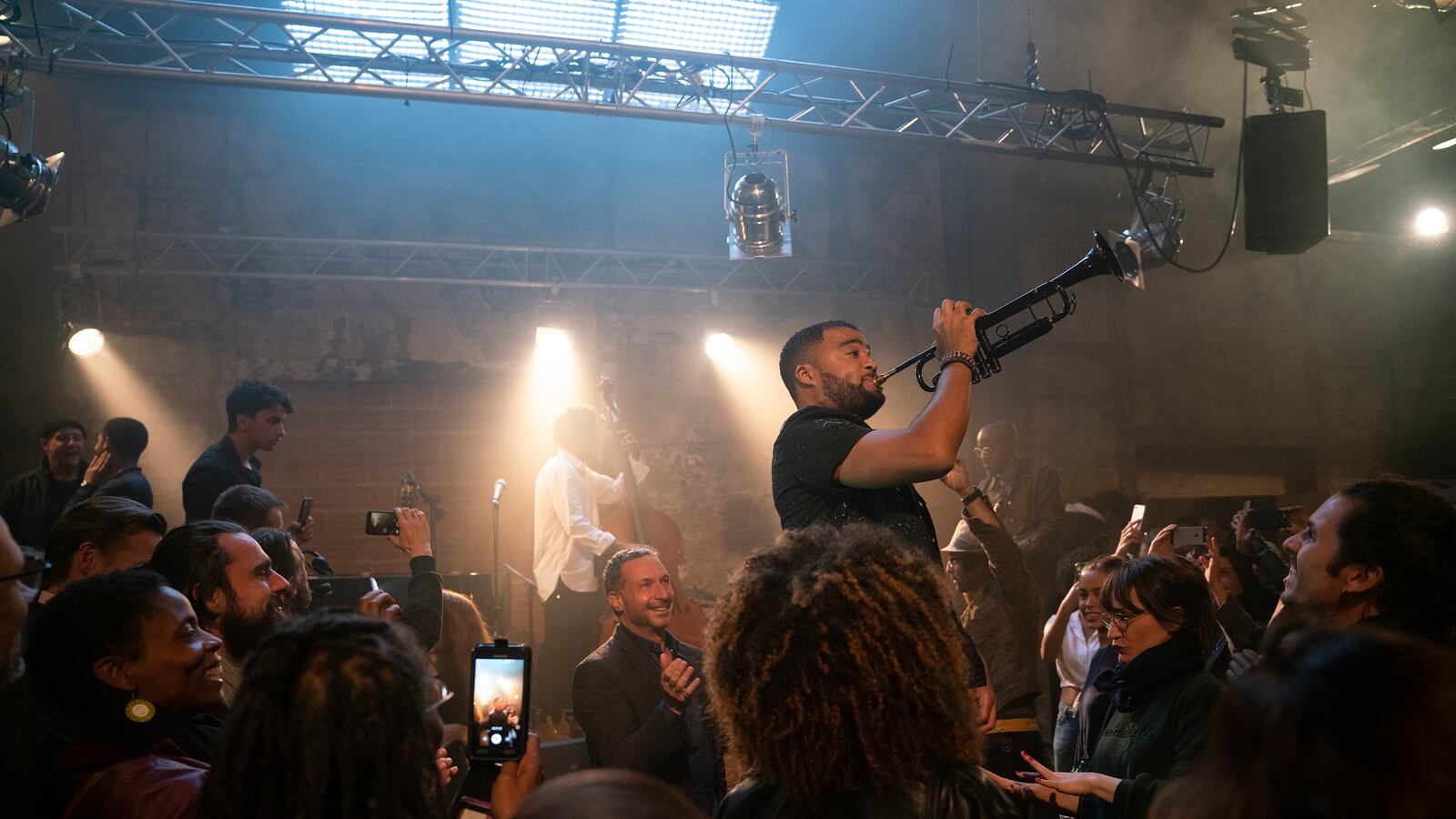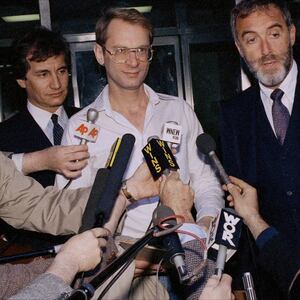The best of the new Netflix show The Eddy, about an eponymous jazz club and its multicultural house band in Paris, is not at all in Whiplash and La La Land director Damien Chazelle’s first two episodes (he is also an executive producer of the series, along with writer Jack Thorne and lead actor Andre Holland). Instead, the show’s brief streak of brilliance can be found in Divines director Houda Benyamina’s following two episodes. It’s Benyamina, and not Chazelle, who understands what jazz can and should do, and is able to advance the show well beyond its tedious crime subplot and into the sublime—that is, of jazz music’s inspiration borne from collectivity.
Benyamina’s episodes, “Amira” and “Jude,” center on two spectacular French actors: Leïla Bekhti plays Amira (Bekhti’s real-life husband Tahar Rahim plays her husband on the show, Farid, who is The Eddy club’s co-owner), and Jisca Kalvanda, who had a supporting role in Divines, plays bass player Jude’s (real-life musician Damian Nueva) old love Habiba. Benyamina—being both French and, by the white colonial French establishment’s standards, not French enough (having been born to Moroccan parents)—harmonizes her knowledge of Paris with her understanding of people. This makes her a great depicter of jazz itself—of how it can move people, transform rooms and landscapes, and demand that musicians bring their most generous selves to the fore, and not their most competitive or egoistic, as Chazelle’s own direction indicates.
But The Eddy’s other owner, Elliott Udo (Holland), does have an ego, or at least an agenda he refuses to share. Udo is perhaps the world’s greatest living jazz pianist, but he doesn’t perform anymore; instead, he’s the house band’s bandleader, composing music and writing lyrics to be sung by the fierce and mercurial Maja (Joanna Kulig, of Cold War fame, does much to elevate a half-written character). A black American enmeshed in the black and North African banlieues, Udo is searching for something that remains unclear for much of the season. Elliott’s daughter, Julie (a very good Amandla Stenberg), has left her white, rich Upper East Side-dwelling mother behind to join her broke and inattentive father in this new world. While Chazelle’s episodes enthusiastically plunge into a grainy, handheld cinema vérité aesthetic as if he’s trying on a new attitude, Benyamina’s episodes find the spontaneity in the environment itself, regarding every inch of the city—from the public to the private, the affluent to the neglected—with reciprocal energy.
In “Amira,” Bekhti gives a portrait of grief that is complex and difficult, yet never claustrophobic, trite, or showy. With her swift yet patient direction, Benyamina orchestrates the best jazz performance in the entirety of the season, bringing a cabal of musicians together in a small apartment with Bekhti moving at their center. The joy and sorrow of jazz, its flightiness and soulfulness, its manic and contemplative energies are not divided and dissected, but caught up in each other, inextricable. Benyamina has a lot of fun with an episode plagued by death, which is no accident—she understands that the contradiction here is essential, that the flourishes of camera and character movement are not mere ornament but essential expressions: that’s the kind of life that created jazz in the first place.
And in “Jude,” Jisca Kalvanda, playing off of Damian Nueva’s still lovelorn Jude, turns facial movements into chord progressions. Thorne’s script sets up obvious juxtapositions, from the simplicity of Habiba’s city hall wedding to another man (which Jude volunteers to be a witness for) to the well-appointed white wedding (in every sense) that they sort of crash afterward. But Benyamina grounds the episode’s various settings in the music and energy ricocheting back and forth from Jude to Habiba as they make sense of the end of their relationship. Jude’s own personal torment, as a recovering heroin addict, is a narrative cliche of little depth, but Benyamina does much to elucidate the unspeakable dynamics that give his story meaning.
Laïla Marrakchi straightforwardly directs the following two episodes, “Maja” and “Sim” (Sim is Julie’s love interest) as does Alan Poul with The Eddy’s final two. Benyamina’s brilliance in taking on The Eddy isn’t only due to her cultural background—that she is of North African descent, from the working class, and was born and raised in a country that she had to, was always going to have to, fight to survive in—though that experience surely informs her. Benyamina also excels because of the joy, and not sense of obligation, she takes in listening.
With The Eddy, Chazelle sought to finally back a project that would actually depict jazz as played by the communal and inventive African diaspora that developed it rather than by white virtuosos who abuse each other to crawl to the top. With original music by Glen Ballard and Randy Kerber and real musicians playing the house band members, The Eddy offers authenticity and inspiration, but only Benyamina meets that challenge with the rigor required.


